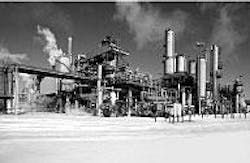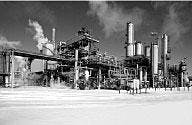EPA eases air regs in wake of Citgo refinery outage
Concerns over US Midwest gasoline supplies have resurfaced because of another refinery outage in the region, and those fears are being quelled by a relaxation of federal air quality regulations.
The US Environmental Protection Agency last week temporarily eased its summertime emissions restrictions to channel more supplies of reformulated gasoline (RFG) into the fuel-short markets of Chicago and Milwaukee.
EPA took that action at the request of Citgo Petroleum Corp., Tulsa, to halt a run-up in Midwest gasoline prices (OGJ Online, Aug. 24, 2001). Regional pump prices for gasoline escalated 20¢/gal the prior week, after a fire knocked out part of Citgo's 158,650 b/d Lemont, Ill., refinery.
A distillation tower at the refinery's crude unit suffered a structural failure Aug. 17 as a result of the Aug. 14 fire. Citgo officials said it could take 6 months to repair that damage.
The Citgo refinery supplies about 16% of the gasoline consumed in Illinois and is one of the few US refineries capable of producing the RFG, blended with ethanol, that is mandated by the EPA for the Chicago market.
Meanwhile, analysts cited a strong surge in refining margins in the US heartland in the wake of the accident, coming at what would otherwise be a seasonally slack period for refiners.
Lehman Bros.' Paul Cheng last week noted that refining margins in the US Midcontinent and Midwest have set or approached record highs in the wake of the Lemont refinery outage. He estimated the weekly average gross cash refining margins in the Midcontinent for the week ended Aug. 24 at $19.32/bbl, vs. $9.37/ bbl the prior week and $3.23/bbl the same period a year ago. The same comparison for the Midwest was $18.36/bbl vs. $13.10/bbl and $7.21/bbl.
EPA action
Citgo executives praised the quick response by EPA officials.
"It means that we should be able to meet all of our contractual agreements with our branded marketers of RFG and conventional gasoline products. It also demonstrates what can quickly be accomplished when governmental agencies and the private sector work in close cooperation," said W.A. DeVore, senior vice-president of supply, marketing, and lubricants at Citgo.
EPA officials relaxed their summertime restrictions on emissions of volatile organic compounds that otherwise would have extended through Sept. 15. The year-round EPA emissions standards for nitrogen oxides and other air toxics remain in place, however.
Under an agreement between Citgo and EPA, distributors and retailers can sell the approved gasoline, which will move through Citgo terminals in Lemont, Des Plaines, and Mt. Prospect, Ill. It also affects gasoline moved through a Milwaukee terminal, jointly owned by Citgo and ExxonMobil Corp., and the Premcor Blue Island, Ill., terminal.
However, Citgo is required to make a payment to the US Treasury equal to "the economic benefit" it receives from distribution and sale of the nonstandard RFG during the prescribed period. That amounts to the cost difference between the production of the normal "summer blend" of gasoline and the less-expensive "winter blend" that Citgo will be selling instead.
Meanwhile, Citgo is considering bringing in feedstocks and blendstocks from other sources that it can run through undamaged units-a coker and a catalytic cracker-at Lemont to produce more gasoline.
Like California, the Chicago-Milwaukee area is an "island" market, dependent primarily on local refiners for its "boutique" blend of gasoline and thus difficult to supply from other areas. That situation resulted in price spikes for the Chicago-Milwaukee market last summer and again early this summer as demand briefly outran supplies amid infrastructure outages.

